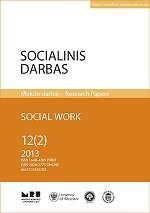Kai kurie tarpgeneracinio solidarumo šeimoje aspektai: tėvų parama suaugusiems vaikams
Some Aspects of the Intergenerational Family Solidarity: Parent’s Assistance to Adult Children
Author(s): Vida KanopienėSubject(s): Social Sciences
Published by: Mykolas Romeris University
Keywords: mother; father; adult children; assistance; intergenerational solidarity
Summary/Abstract: Population aging in Western societies leads to the increasing interest in intergenerational support relationships. However, until now, the studies in this field have focused mostly on the upward family transfers from the younger to the older generation. The article discusses the role of parents in provision of support to their adult children, aiming to compare the types of given/ received assistance in different age cohorts and pursuing to reveal women’s and men’s roles as assistance providers to their adult children. These issues are explored based on the data of qualitative research, conducted in the framework of the project “Trajectories of Family Models and Social Networks: Intergenerational Dimension”. 60 face-to-face in-depth interviews were conducted during June-August, 2012 in six selected regions of Lithuania (in rural areas, small and large towns, cities) by four researchers of the department of Sociology. Talking about the informants, there were 30 females and 30 males, respectively 15 persons of each of four birth cohorts: 1950-1955, 1960-1965, 1970-1975 and 1980-1985. The conceptualization of support, as proposed by E. Scabini (2006), and on the concept of solidarity, as proposed by Vern L. Bengtson and his colleagues (2001), make a theoretical framework of the conducted research. The comparison of individual cases of two birth cohorts of females and males – the “older”, who were the recipients (in the past) and providers of support, and the “younger”, who did not have adult children and themselves were supported by their parents – enabled to reveal the types and strategies of support provision during the Soviet years and a period of Independence. Analysis of interview data showed that parents’ assistance to their children remains intense even after the latter form their own family, which demonstrates the existence of strong functional solidarity in families that is transmitted from generation to generation. Women are the principal childcare givers (they take care of grandchildren), while men’s role is more important in providing some specific instrumental assistance and financial-material support.
Journal: Socialinis darbas
- Issue Year: 12/2013
- Issue No: 2
- Page Range: 215-226
- Page Count: 12
- Language: Lithuanian

